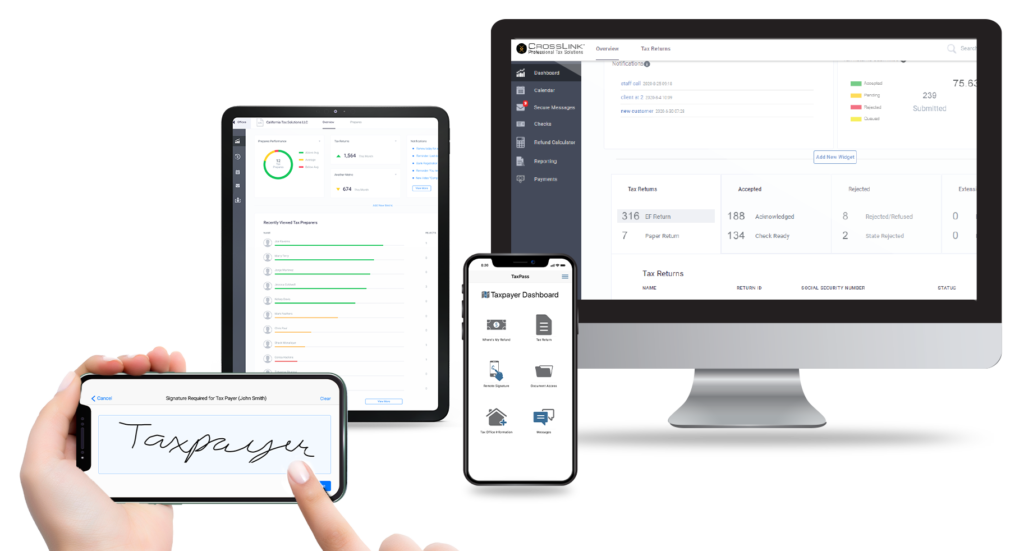
State Earned Income Tax Credit (EITC) and Child Tax Credit Requirements
Thirty-one states and the District of Columbia have enacted their own version of the federal Earned Income Tax Credit (EITC). The details of each state EITC requirements are explained below.
Also, eight states have enacted their own version of the federal Child Tax Credit. Of these eight states, all but one also has an EITC. The details for each state are explained below.
California Earned Income Tax Credit
California EITC
California’s EITC has its own calculation.
The maximum EITC is as follows:
- $1,900 for one child
- $3,137 for two children
- $3,529 for 3 or more children
California EITC Requirements
To qualify for California’s EITC, a California taxpayer must meet all of the following requirements:
- Be at least 18 years old or have a qualifying child
- Have earned income between $1 and $30,950
- Have a valid SSN or ITIN for the taxpayer, their spouse, and any qualifying children
- Live in California for more than half the year
- Not be eligible to be claimed as a qualifying child of another taxpayer
- Not be eligible to be claimed as a dependent of another taxpayer unless they have a qualifying child.
For more details, see the following on the California Franchise Tax Board website:
California Child Tax Credits
California has the following child tax credits that are based on earned income and the taxpayer having a qualifying child:
California Young Child Tax Credit
This credit provides up to $1,117 for Californians who qualify for the California EITC and have a child under the age of 6 years old.
For more information, see the Young Child Tax Credit page on the California Franchise Tax Board website.
California Foster Youth Tax Credit
This credit provides a credit of up to $1,117 per eligible individual or up to $2,223 if both the primary and spouse qualify.
Current and former foster youth must meet all of the following requirements:
- Qualify for the California EITC
- Were 18 – 25 at the end of the year
- Were in California foster care at age 13 or older and placed through the California foster care system
- Satisfy foster care verification requirement
For more information, see the Foster Youth Tax Credit page on the California Franchise Tax Board website.
Colorado Earned Income Tax Credit and Child Tax Credit
Colorado EITC
The Colorado EITC is refundable and only in 2023 is calculated as 50% of the federal EITC.
For Colorado taxpayers that cannot claim the Federal EITC, they may be able to claim the Colorado EITC if:
- The taxpayer, spouse, or dependents had an ITIN
- The taxpayer is under age 25 with no qualifying children, have a valid SSN, and meet the requirements included on Form DR 0104TN (see the DR 0104TN webpage for more information)
For more information, see the following on the Colorado Department of Revenue website:
- Earned Income Tax Credit for SSN Filers
- Colorado EITC for ITIN Filers or Certain Filers Under Age 25
Colorado Child Tax Credit
The Colorado child tax credit is refundable and is calculated as a percentage of the federal child tax credit based on the taxpayer’s adjusted gross income.
Colorado resident taxpayers with dependent children under age 6 who qualify for the federal child tax credit qualify for the Colorado Child Tax Credit if:
- They are a single filer with a Federal AGI no greater than $75,000
- They are a joint filer with a Federal AGI no greater than $85,000
The Colorado Child Tax Credit is calculated as a percentage of the federal child tax credit as follows:
- Single filers:
- 60% if federal AGI is $25,000 or less
- 30% if federal AGI is between $25,0001 and $50,000
- 10% if federal AGI is between $50,001 and $75,000
- No credit allowed if AGI is over $75,000
- Married filing joint filers:
- 60% if federal AGI is $35,000 or less
- 30% if federal AGI is between $35,001 and $60,000
- 10% if federal AGI is between $60,001 and $85,000
- No credit allowed if AGI is over $85,000
For more information, see the following on the Colorado Department of Revenue website:
- Colorado Child Tax Credit page
- Colorado Form DR 0104CN (form and instructions)
Connecticut Earned Income Tax Credit
The Connecticut earned income tax credit (EITC) is refundable and is calculated as 40% of the federal EITC.
Connecticut EITC Requirements
To qualify for Connecticut EITC a taxpayer must:
- Have claimed and been allowed the EITC on their federal return and
- Be a full-year resident of Connecticut.
For more information, see the following on the Connecticut Department of Revenue Services website:
- CT Earned Income Tax Credit page
- Connecticut Resident Income Tax Return Instructions (Page 16 – Schedule CT-EITC – Line instructions)
Delaware Earned Income Tax Credit
The Delaware earned income tax credit (EITC) is calculated as:
- A refundable credit of 4.5% of the federal EITC
Or
- A nonrefundable credit of 20% of the federal EITC
If a Delaware taxpayer qualifies for the federal EITC, they qualify for the Delaware EITC.
The determination of whether the taxpayer is allowed a refundable or nonrefundable EITC is based on whether 4.5% of the federal EITC is greater or less than Delaware AGI. If 4.5% of the Federal EITC is greater than or equal to Delaware AGI the Delaware EITC is calculated as 4.5% of the federal EITC and is refundable. Otherwise, the Delaware EITC is calculated as 20% of the federal EITC or the net tax after all other nonrefundable credits, whichever is less.
See the Delaware Individual Income Tax Return – Resident instructions (Page 10 – Line 33) for more information.
Hawaii Earned Income Tax Credit
The Hawaii earned income tax credit (EITC) is refundable and is calculated as 40% of the federal EITC.
Hawaii EITC Requirements
A Hawaii taxpayer will qualify for the Hawaii EITC if they qualify for the federal EITC. They must file a federal return and claim EITC and file a Hawaii tax return using the same filing status used on the federal return and claim the same dependents claimed on the federal return.
Beginning in 2023, the Hawaii EITC is made permanent and is fully refundable.
For more information, see the Hawaii Schedule CR instructions for line 8 (Earned Income Tax Credit) on the Hawaii Department of Taxation website.
Idaho Earned Income Tax Credit
Idaho does not have an earned income tax credit.
Idaho Child Tax Credit
The Idaho Child Tax Credit is non-refundable.
This credit is calculated as $205 per qualifying child.
To qualify for the Idaho Child Tax Credit a child must be:
- The taxpayer’s qualifying child for federal purposes
And
- Age 16 or under as of the end of the year
See the Idaho Form 40 instructions for line 25 (Idaho Child Tax Credit Worksheet) on the Idaho State Tax Commission website.
Illinois Earned Income Tax Credit
The Illinois earned income tax credit (EITC) is refundable and is calculated as 20% of the federal EITC.
In general, if an Illinois taxpayer qualified for the federal EITC, they will also qualify for the Illinois EITC.
For more information see the following on the Illinois Revenue website:
Indiana Earned Income Tax Credit
The Indiana earned income tax credit (EITC) is refundable and is calculated as 10% of the federal EITC.
In general, if an Indiana taxpayer qualified for the federal EITC, they will also qualify for the Indiana EITC.
For more information see Publication EIC Indiana Earned Income Tax Credit on the Illinois Department of Revenue website.
Iowa Earned Income Tax Credit
The Iowa earned income tax credit (EITC) is refundable and is calculated as 15% of the federal EITC.
An Iowa taxpayer will qualify for the Iowa EITC, if they qualify for the federal EITC.
For more information, see the Iowa Earned Income Tax Credit Instructions on the Iowa Department of Revenue website.

Kansas Earned Income Tax Credit
The Kansas earned income tax credit (EITC) is refundable and is calculated as 17% of the federal EITC.
The taxpayer must be a Kansas resident and qualify for the federal EITC to qualify for the Kansas EITC.
For more information, see the Kansas Individual Income Tax Instructions on page 8 on the Kansas Department of Revenue website.
Louisiana Earned Income Tax Credit
The Louisiana earned income tax credit (EITC) is refundable and is calculated as 5% of the federal EITC.
Maine Earned Income Tax Credit
The Maine earned income tax credit (EITC) is refundable and is calculated as a percentage of the federal EITC.
The percentage is 25% for taxpayers with children and 50% for taxpayers with no qualifying children.
Taxpayers using an ITIN or who are 18 to 24 years of age and have no qualifying children, and otherwise qualify for federal EITC may also be eligible for the Maine EITC.
For nonresidents, the Maine EITC is nonrefundable.
For more information, see the following on the Maine Revenue Services website:
Maryland Earned Income Tax Credit
The Maryland earned income tax credit (EITC) is refundable and is calculated as follows:
- 50% of the federal EITC for Maryland taxpayers with at least one qualifying child
- 100% of the federal EITC for Maryland taxpayers without a qualifying child.
If a Maryland taxpayer qualifies for the federal EITC and they claim it on their federal return, they qualify for the Maryland EITC.
Maryland taxpayers who do not meet the minimum age requirement under the federal EITC, are also otherwise eligible for the federal credit for those without a qualifying child, may claim the Maryland EITC.
Maryland taxpayers who possess a valid SSN but are otherwise eligible for the federal EITC and are filing a Maryland return with an ITIN may claim the Maryland EITC.
For more information see the following on the Comptroller of Maryland website:
- Maryland Resident Booklet instructions for Line 18 (Earned Income Credit)
- Tax Credits page – Earned Income Tax Credit section
Massachusetts Earned Income Tax Credit
The Massachusetts earned income tax credit (EITC) is refundable and is calculated as 40% of the federal EITC.
A taxpayer is eligible for Massachusetts EITC if they are a Massachusetts resident for at least part of the year and meet the requirements to claim the Federal EITC.
For more information, see the Earned Income Tax Credit page on the Massachusetts Department of Revenue website.
Michigan Earned Income Tax Credit
The Michigan earned income tax credit (EITC) is refundable and is calculated as 6% of the federal EITC.
A Michigan taxpayer is eligible for Michigan EITC if they are eligible to claim the federal EITC.
For more information see the Michigan Earned Income Tax Credit for Working Families page on the Michigan Department of Treasury website.
Minnesota Working Family Credit
The Minnesota Working Family Credit is refundable and is calculated on Schedule M1WFC.
The Working Family Credit is similar to the Federal EITC. The credit is based on the number of qualifying children, filing status and the taxpayer’s earned income for the year. To be eligible, a taxpayer must meet the following requirements:
- Be a full-year or part-year resident of Minnesota
- Meet the income requirements that are included in the Schedule M1WFC instructions
- Have investment income of less than $10,300
- Cannot be a dependent of another person
- If they have no qualifying children, they and their spouse’s main home must be in the U.S. for more than half the year.
- If they are married and they or their spouse are a nonresident alien, their filing status must by Married Filing Jointly.
For more information see the following on the Minnesota Department of Revenue website:
- Working Family Credit page
- Schedule M1WFC – form and instructions
Child Tax Credit (Refundable)
- New for 2023
- $1,750 per qualifying child
- Credit is fully refundable
- Credit begins to phase out when the taxpayer’s earned income or AGI (whichever is greater) reaches:
- $35,000 for MFJ
- $29,500 for all other filers
- Possibility in the future that Commissioner of Revenue may establish a process to allow taxpayers to receive an advance payment of the credit.
For more information see the Child Tax Credit page on the Minnesota Department of Revenue website.
Missouri Earned Income Tax Credit
Missouri Working Family Tax Credit
- New for 2023
- Credit is nonrefundable
- Credit is 10% of Federal EITC
- Eligibility for the credit is based on family size and income.
For more information see Form MO-WFTC (form and instructions on the Missouri Department of Revenue website.
Montana Earned Income Tax Credit
The Montana earned income tax credit (EITC) is refundable and is calculated as 3% of the federal EITC.
A taxpayer is eligible for the Montana EITC if they are a Montana resident for at least part of the year, file as married filing separately, and meet the requirements to claim the Federal EITC.
For more information see the following on the Montana Department of Revenue website:
- Montana Earned Income Tax Credit page
- 2023 Montana Form 2 instructions beginning on Page 11.
Nebraska Earned Income Tax Credit
The Nebraska earned income tax credit (EITC) is refundable and is calculated as 10% of the federal EITC.
A Nebraska taxpayer is eligible for the Nebraska EITC if they qualify for the federal EITC.
For more information, see the Nebraska Individual Income Tax Booklet instructions for line 34 (which includes the Nebraska Earned Income Tax Worksheet) on the Nebraska Department of Revenue website.

New Jersey Earned Income Tax Credit and Child Tax Credit
New Jersey EITC
The New Jersey earned income tax credit (EITC) is refundable and is calculated as 40% of the federal EITC.
New Jersey EITC Requirements
A New Jersey taxpayer is eligible for the New Jersey EITC if they meet the following requirements:
- Must be a New Jersey resident who works and earns income
- Must be at least 18 years old, with or without a qualified dependent
- Meet the federal limits for their filing status and claimed dependents
- Have a valid Social Security Number
- File a New Jersey Resident Income Tax Return (NJ-1040), even if their New Jersey gross income is below the filing threshold
For more information, see the New Jersey Earned Income Tax Credit page on the New Jersey Division of Taxation website.
New Jersey Child Tax Credit
The New Jersey Child Tax Credit is refundable.
For 2023 the credit was doubled for each dependent child age 5 or younger as follows:
- $1,000 – Taxable income is $30,000 or less
- $800 – Taxable income is over $30,000 but not over $40,000
- $600 – Taxable income is over $40,000 but not over $50,000
- $400 – Taxable income is over $50,000 but not over $60,000
- $200 – Taxable income is over $60,000 but not over $80,000
For more information, see the Child Tax Credit page on the New Jersey Division of Taxation website.
New Mexico Working Families Tax Credit
The New Mexico Working Families Tax Credit is refundable and is calculated as 20% of the federal EITC.
New Mexico taxpayers who lived in New Mexico for any part of the year and qualify for the federal EITC qualify for the New Mexico Working Families Credit.
Also, a taxpayer will qualify for the Working Families Tax Credit if they would have been eligible for the federal EITC except that they had an ITIN or the taxpayer was between 18 and 24 years of age.
For more information, see the Form PIT-1 instructions, page 31 on the New Mexico Taxation and Revenue website.
New York Earned Income Tax Credits and Child Tax Credit
New York EITC
The New York earned income tax credit (EITC) is refundable and is calculated as 30% of the taxpayer’s allowable federal earned income tax credit, reduced by the amount of any household credit.
New York EITC Requirements
A New York taxpayer may be entitled to claim the New York EITC if they:
- Did not claim the New York Noncustodial parent earned income tax credit
and
- They qualified and claimed the federal earned income tax credit, or could have, based on their New York recomputed Federal Adjusted Gross Income.
For part-year or nonresidents, the New York EITC is:
- Part-Year Resident – partially refundable
- Nonresident – nonrefundable
For more information, see the following on the New York Department of Taxation and Finance website:
New York Noncustodial Parent Earned Income Tax Credit
New York taxpayers may be entitled to claim the New York Noncustodial Parent Earned Income Tax Credit if they:
- Did not claim the New York State Earned Income Tax Credit
- Were a full-time New York State resident
- Were at least 18 years of age
- Are a parent of a child who did not reside with them and was under 18 years old
- Have an order in effect for at least one-half of the year requiring the taxpayer to make child support payments payable through a New York State Support Collection Unit
and
- Have paid at least the court-ordered amount of child support during the year.
This credit is calculated as the greater of:
- 20% of the federal EITC that the taxpayer could have claimed (based on their NY recomputed federal AGI) if the noncustodial child met the qualifying child definition. Compute it as if you had one qualifying child without the benefit of the joint return phase-out amount (even if you had a married filing joint return);
or
- 2.5 times the federal EIC that you could have claimed (based on your NY recomputed FAGI) if you met the eligibility requirements, computed as if you had no qualifying children.
For more information, see the following on the New York Department of Taxation and Finance website:
Empire State (New York) Child Tax Credit
The Empire State (New York) Child Tax Credit is refundable.
The Empire State Child Credit is calculated as the lesser of:
- 33% of the portion of the federal child tax credit and the federal additional child tax credit (calculated using the NY recomputed federal AGI as well as the federal credit amounts and income thresholds in effect for tax year 2017) attributable to qualifying children;
or
- $100 multiplied by the number of qualifying children.
If a New York taxpayer claims the federal child tax credit but meets all other eligibility requirements for the Empire State Child Credit, the amount of the credit is calculated as $100 multiplied by the number of qualifying children.
For more information, see the following on the New York Department of Taxation and Finance website:
Ohio Earned Income Tax Credit
The Ohio earned income tax credit (EITC) is non-refundable and is calculated as 30% of the federal EITC.
An Ohio taxpayer is eligible for the Ohio EITC if they qualify for the federal EITC.
For more information, see the Ohio IT1040 instructions under the Ohio Schedule of Credits section for line 13 (Earned Income Tax Credit).
Oklahoma Earned Income Tax Credit
The Oklahoma earned income tax credit (EITC) is refundable and is 5% of the federal EITC, calculated using the same requirements for calculating the earned income tax credit for federal income tax purposes in effect for the 2020 income tax year. It is also based on the taxpayer’s earned income for either Tax Year 2022 or 2023.
An Oklahoma taxpayer is eligible for the Oklahoma EITC if they qualify for the federal EITC.
For more information, on how the credit is calculated see the Oklahoma Form 511-EIC on the Oklahoma Tax Commission’s website.
Oregon
Earned Income Tax Credit
The Oregon earned income tax credit (EITC) is refundable and is calculated as 12% of the federal EITC for children younger than 3 and 9% of the federal EITC for all other eligible children.
If an Oregon taxpayer qualifies for the federal EITC, they can claim the Oregon EITC. Also, taxpayers with an ITIN may claim the Oregon EITC if they otherwise qualified for the federal EITC.
For more information, see the Tax Benefits for Families page on the Oregon Department of Revenue website.
Child Tax Credit
Legislation enacted in 2023 included a provision that creates a refundable child tax credit (Oregon Kids Credit) as follows beginning in 2023:
- Applies to children under age 6 as of the close of the year who are dependents of the taxpayer.
- The credit is $1,000 per qualifying dependent (5 per return). Taxpayer qualifies for maximum credit if their Oregon AGI is $25,000 or less. Credit phases out between $25,001 and $30,000.
- Does not apply to MFS returns.
- In the future Oregon will work to create an advance of this credit by making quarterly payments to eligible taxpayers.
Rhode Island Earned Income Tax Credit
The Rhode Island earned income tax credit (EITC) is refundable and is calculated as 15% of the federal EITC.
A Rhode Island taxpayer is eligible for the Rhode Island EITC if they qualify for the federal EITC.
South Carolina Earned Income Tax Credit
The South Carolina earned income tax credit (EITC) is non-refundable and is calculated as 125% of the federal EITC allowed to the taxpayer.
The South Carolina EITC is available to full-year resident individuals if they qualify for the federal EITC.
For more information, see the South Carolina Schedule TC-60 on the South Carolina Department of Revenue website.
Utah Earned Income Tax Credit
The Utah Earned Income Tax Credit (EITC) is non-refundable and is calculated as 20% of the federal EITC.
To claim the Utah Earned Income Tax Credit, a Utah taxpayer must qualify for the federal EITC and claim it on their federal tax return.
For more information, see the following on the Utah Tax Commission website:
- Earned Income Tax Credit (code AM) page
- Form TC-40 Instructions on page 21 (AM Earned Income Tax Credit)
Vermont Earned Income Tax Credit and Child Tax Credit
Vermont EITC
The Vermont earned income tax credit (EITC) is refundable and is calculated as 38% of the federal EITC.
If a Vermont taxpayer is full year resident and qualifies for the federal EITC, they also qualify for the Vermont EITC.
For more information, see the Tax Credits and Adjustments for Individuals page on the Vermont Department of Taxes website.
Vermont Child Tax Credit
The Vermont Child Tax Credit is refundable. The credit is $1,000 per child that is five years or younger at the end of the year and phases out as the taxpayer’s AGI increases.
For more information, see the Tax Credits and Adjustments for Individuals page on the Vermont Department of Taxes website.

Virginia Earned Income Tax Credit
If a Virginia taxpayer qualifies for the federal earned income tax credit, they will qualify for the refundable and nonrefundable Virginia earned income tax credit as follows:
- Refundable – Calculated as 15% of the federal EITC
- Nonrefundable – Calculated as 20% of the federal EITC
For more information, see the Low Income Individuals Credit and Virginia EITC page on the Virginia Tax website.
Washington Working Families Credit
The Washington Working Families Credit is similar to the federal EITC.
Washington Working Families Credit Requirements
Washington residents are eligible for the Working Families Credit if they meet all of the following:
- Have a valid SSN or ITIN
- Lived in Washington over half the year (over 183 days)
- Must be at least 25 and under 65 or have a qualifying child
- Filed a federal income tax return
- Are eligible to claim the federal EITC or would meet the requirements for federal EITC but are filing with an ITIN.
The credit is based on the number of qualifying children, federal filing status, and income as follows:
- No children – Up to $300
- 1 Child – Up to $600
- 2 Children – Up to $900
- 3 or more children – Up to $1,200
For more information, see the Working Families Credit – Eligibility page on the Washington Department of Revenue website.
Washington DC Earned Income Tax Credit
The Washington DC earned income tax credit (EITC) is refundable and is calculated as 70% of the federal EITC.
If a Washington DC taxpayer claims the federal EITC, they can claim the Washington DC EITC.
For more information, see the District of Columbia Earned Income Tax Credit page on the Washington DC Office of Tax and Revenue website.
Wisconsin Earned Income Tax Credit
The Wisconsin earned income tax credit (EITC) is refundable and is based on a percentage of the federal EITC.
The percentage is dependent on the number of qualifying children a taxpayer has as follows:
- One – 4% of federal EITC
- Two – 11% of the federal EITC
- Three or more – 34% of the federal EITC
Wisconsin EITC Requirements
To qualify for the Wisconsin EITC, a taxpayer must meet all of the following:
- Qualify for the federal EITC
- Have at least one qualifying child
- Be a full-year Wisconsin resident
- File a joint return if they are married
- Have investment income less than $3,800
For more information, see the Individual Income Tax – Earned Income Credit page on the Wisconsin Department of Revenue website.
What is EITC?
The Earned Income Tax Credit (EITC) helps low-income and moderate-income taxpayers, and their families, reduce their taxable income, thereby potentially increasing their tax refund. The amount of a taxpayer’s credit is dependent on certain criteria, including if they have children or dependents, are disabled, or meet additional qualifications.
Claiming the EITC may cause your tax refund to be delayed until mid-February.
CrossLink Professional Tax Software

CrossLink is the industry’s leading professional tax software solution for high-volume tax businesses and includes all of the EITC requirements for both federal and state tax returns. Built based on the needs of busy tax offices and mobile tax preparers that specialize in providing their taxpayer clients with fast and accurate tax returns, CrossLink has been a trusted software solution since 1989. CrossLink’s in-depth tax calculations, advanced technological features, and paperless solutions allow you to prepare the most complicated tax returns with confidence and ease while providing your customers an unparalleled experience.


